
Welcome back to Flexibility Is Freedom!
It's a New Year and I for one feel a sense of optimism for 2021.
January was a cold winter month in Canada ❄️ but a very productive time for me.
In this month's income report, I'm going to cover a broad range of topics, including an update (or lack thereof) on my website's performance, business initiatives, and new opportunities.
P.S. I started a new weekly podcast! Check it out at Anchor.fm, Spotify, Google Podcasts, or wherever you get your podcast fix 👍.
Overall, revenue is down ~75% from November 2020 with a corresponding 75% decline in traffic. Revenue per 1,000 Sessions remains flat at $107 (vs $109 in Nov 2020).
This month's (under)performance confirms to me that the main problem is a loss of TRAFFIC following Google's December 2020 Core Update.
Last month, I talked about how my website was hit extremely hard by the latest Google update (and some of my plans to recover traffic, including a link disavow).
Here's the most recent traffic data from Google Search Console - no signs of improvement yet:
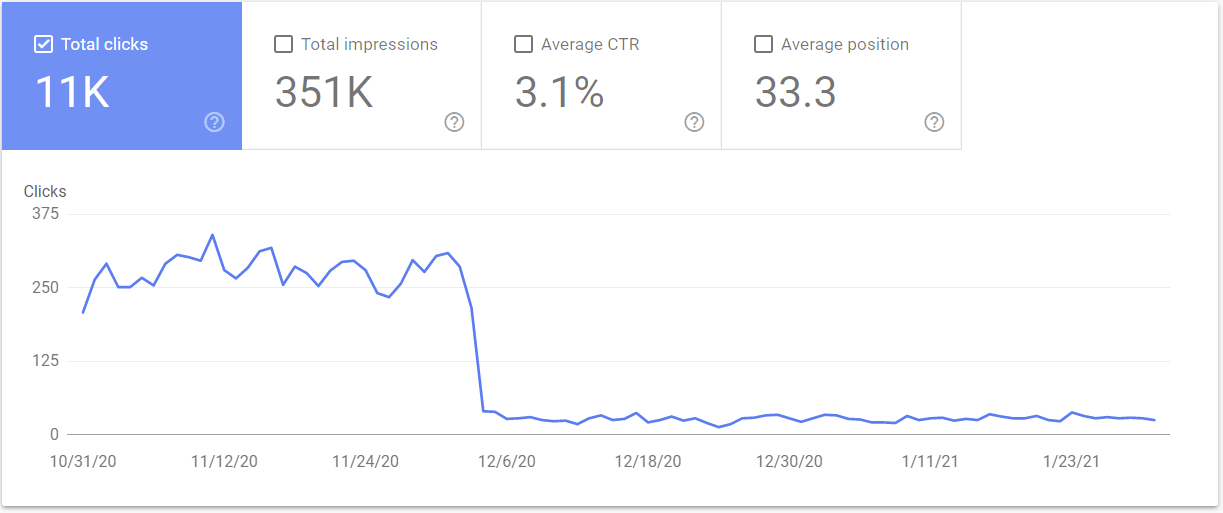
This month, I've been doing a lot more research on my competitors in Ahrefs (both big and small) to better understand who the winners/losers are from each Google Update.
(SEO is a zero-sum game: someone wins and someone loses. More accurately, Google always wins)
Based on what I've seen (so far), most content publishers in the health/beauty/skincare space have been LOSING TRAFFIC for over 2 years now, starting with the Medic Update in 2018 and accelerated by the March 2019 Core Update and September 2019 Core Update.
For example, let's start by looking at a few "high-quality" (i.e. not purely affiliate) competitors:
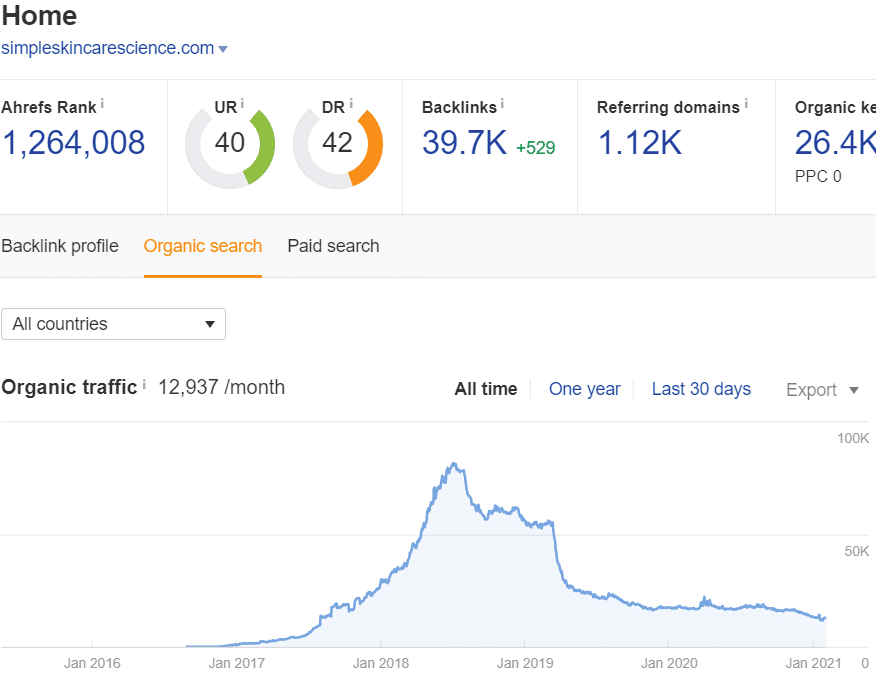
This first one, simpleskincarescience.com, is a very established player with backlinks from the most authoritative domains, including Healthline (DR 91), Gizmodo (DR 90), and Bustle (DR 89).
Even so, traffic peaked in July 2018 before dropping ~25% after Medic Update in August 2018.
The real damage, however, came from March 2019 Core Update where it lost >50% of its traffic and NEVER RECOVERED (traffic continued to decline afterwards).
The bright side is that this website still gets relatively good traffic today.
Next, let's look at two more "high-quality" competitors:
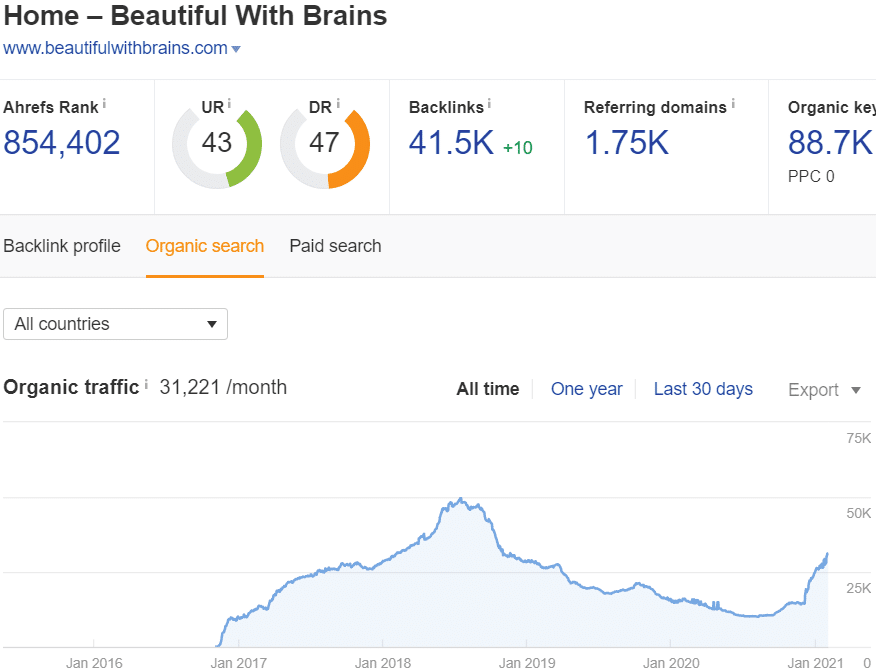
This website is very similar to the last one (both are science-based skincare blogs).
Again, traffic has been declining since Medic Update, but this one received a boost from the recent December 2020 Core Update. Interesting...
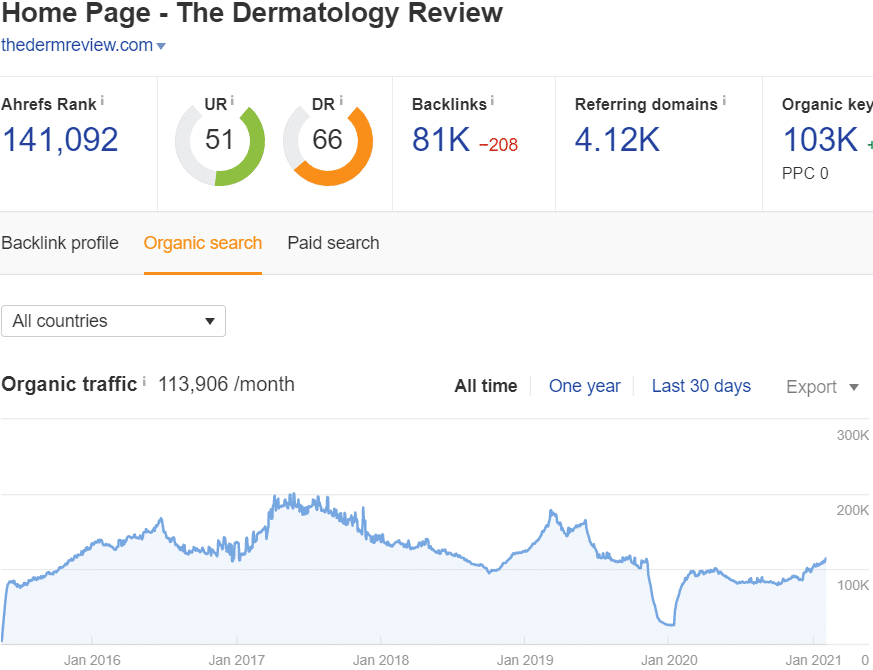
This next one is a different example as it's a content publisher with ZERO affiliate links.
The owner owns a skincare brand and he/she uses their traffic to promote their brand.
(this is a common strategy: you see it with Skincare.com and L'Oreal, Bangkok.com and Hotels.com, etc. Basically, the content publisher and merchant are vertically integrated).
In this case, traffic has been relatively stable (key word: relative). It was declining since early 2017 but actually picked up a lot of traffic in the chaos of Medic Update.
Alright, now I want to show an example or two of what happened to obvious affiliate websites.
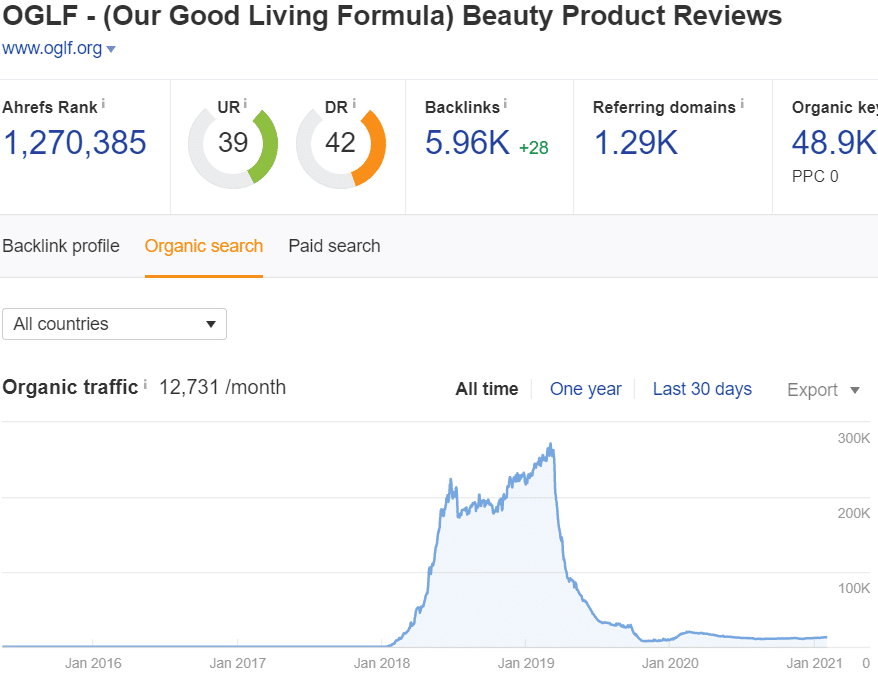
I talked about this website, OGLF, way back in my post on "The Dark Side of Affiliate Marketing".
This was previously a lifestyle blog run by a couple - then likely bought as an expired domain and repurposed as an affiliate website.
As you can see, they did extremely well (even defying Medic Update) and grew traffic to 250,000+ visits per month (Ahrefs is pretty conservative, that's probably well over a million visits!).
I hope the owner sold at the right time because March 2019 Core Update killed those gains and September 2019 Core Update just rubbed salt into the wounds.
Here, I think the website was caught for its misuse of expired domains and 301 redirects to artificially boost its link juice (essentially, Google dialed back those links to zero).
However, as I pointed out back in 2018, OGLF is also extremely biased and if you look at them for more than a minute, it's obvious that they're another spammy affiliate website.
One more example here: PerformanceSkin.com
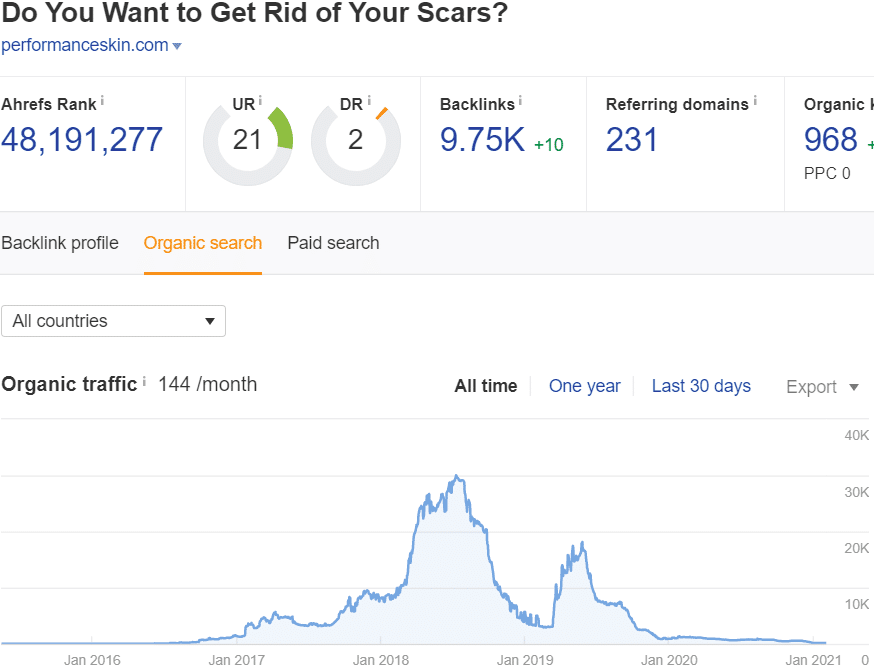
When I started out, this website was a role model for me because it ranked for a super competitive keyword "best scar cream" (often at the top of the SERPs).
These days, however, only the "titan" health websites (Healthline, WebMD, etc.) rank for it now.
Since its backlink profile is not particularly strong, I suspect this website used PBNs to boost their money pages (which are hidden from Ahrefs' crawler).
In any case, their traffic tanked after Medic Update, with a strange rebound in March 2019 that reversed in September 2019. Then traffic basically went to zero. 🤔
Okay, enough of the doom and gloom!
So who is actually winning the SEO game in the health/beauty/skincare space?
Well, it's primarily massive content publishers (I call them "titans") like Healthline, WebMD, and medical organizations like Mayo Clinic and Cleveland Clinic.
However, even amongst the titans, there are winners and losers (for example, Dr. Axe was a massive loser following the Medic Update).
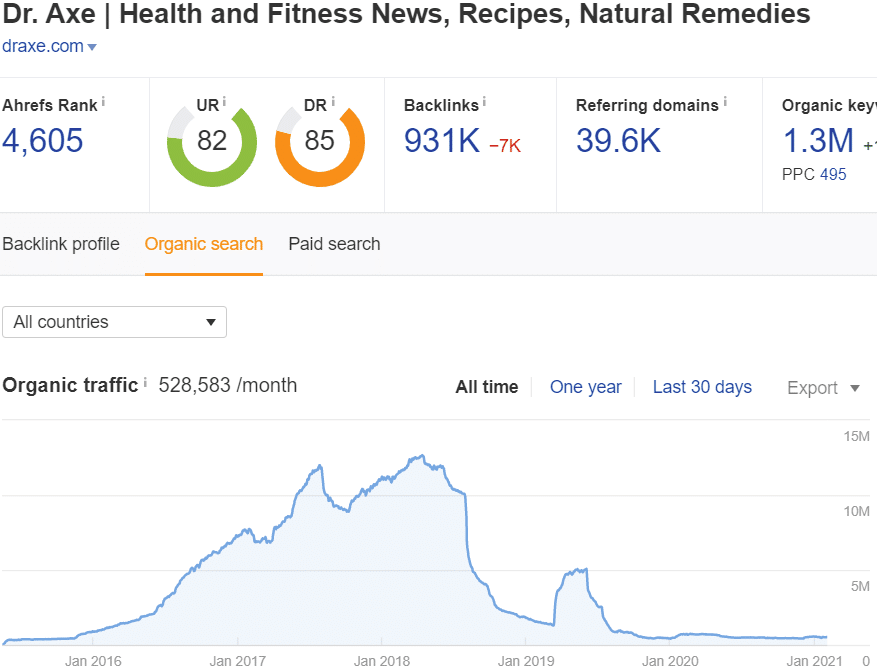
VeryWellHealth is another loser, although traffic is more like a "see-saw".
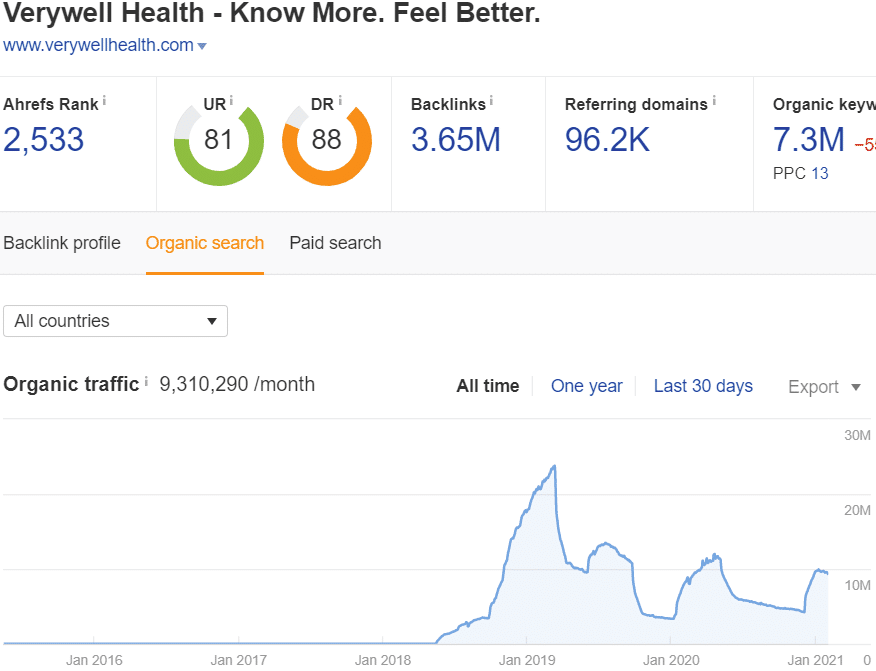
On the other hand, the winners include: Healthline, WebMD, Mayo Clinic, and Byrdie.
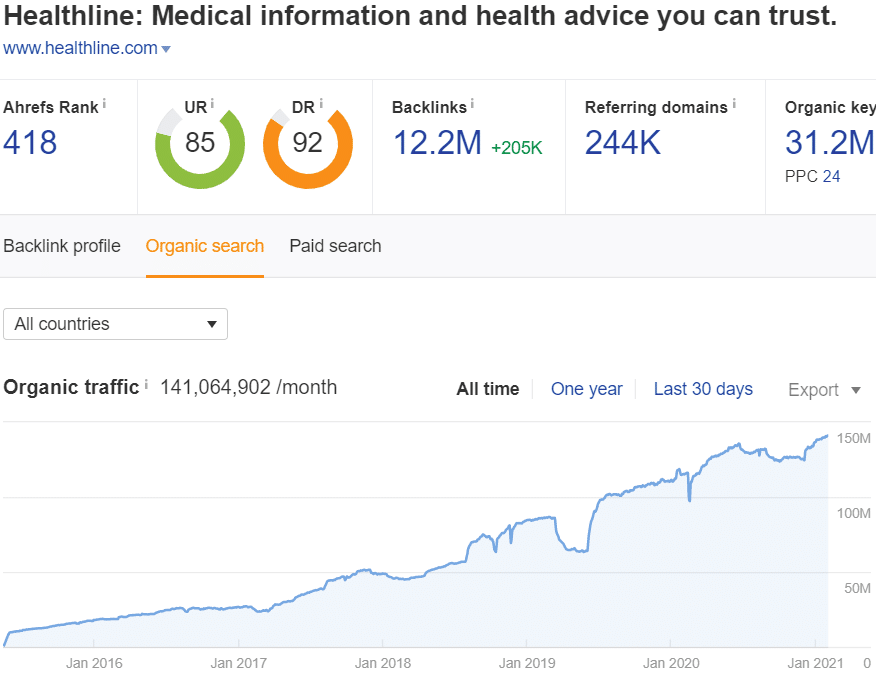
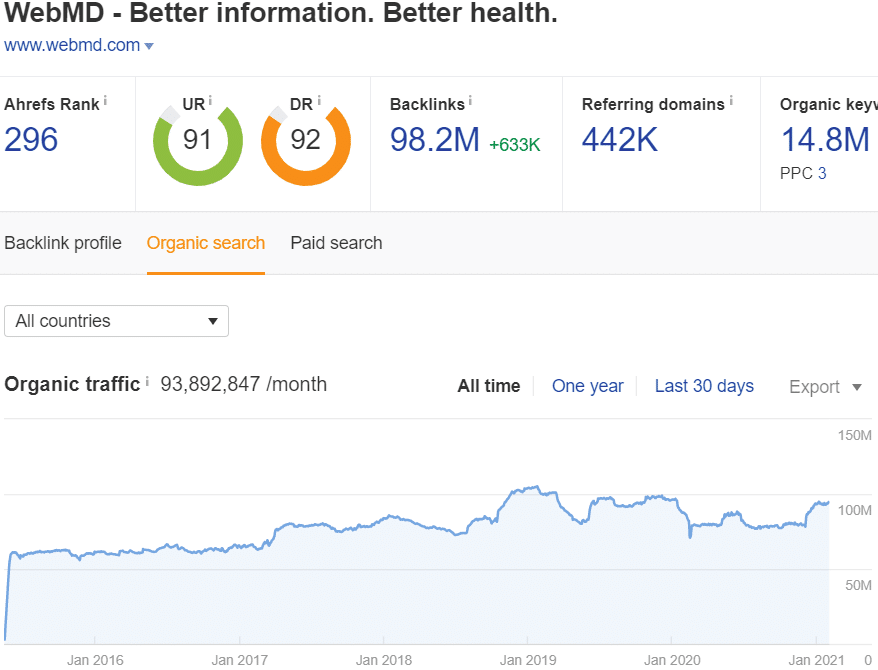
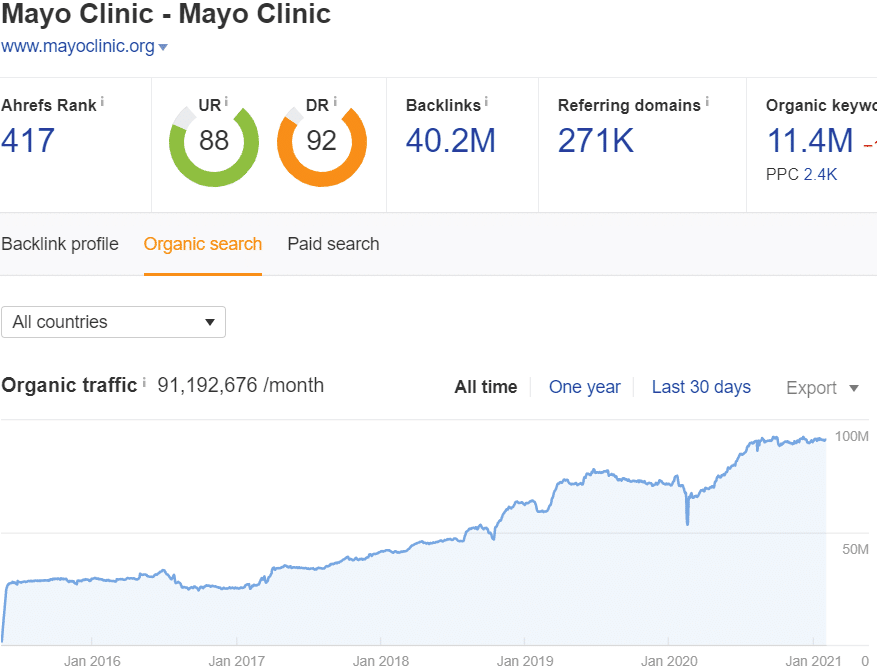
Finally, one last traffic graph for this post - this one is Byrdie.com, a massive beauty website that has been steadily growing over time.
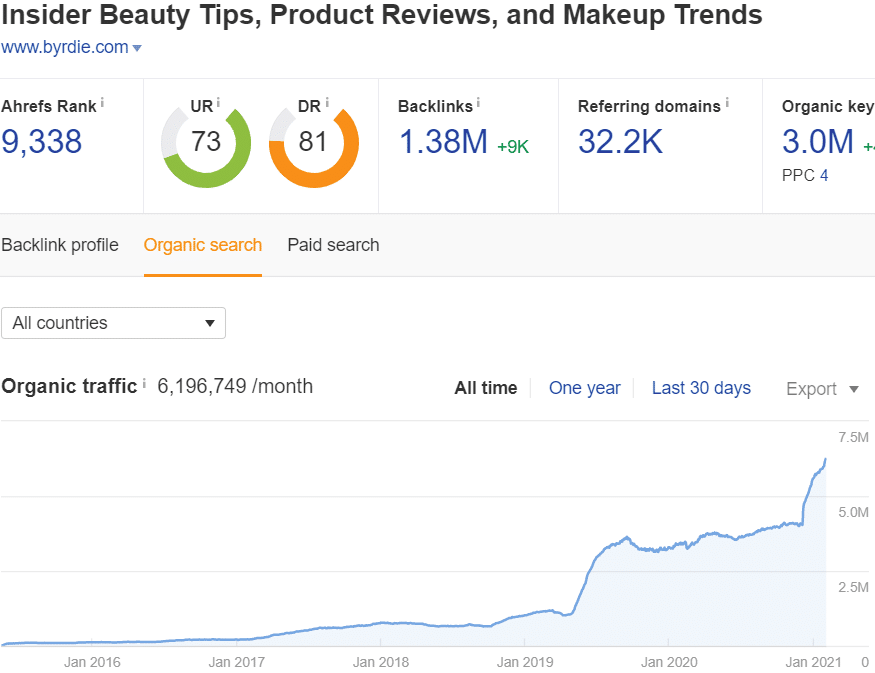
Upon closer investigation, however, Byrdie is actually a very well disguised affiliate website!
Over 5,000 out of 10,000+ pages include the word "best" in the URL or Top Keyword:
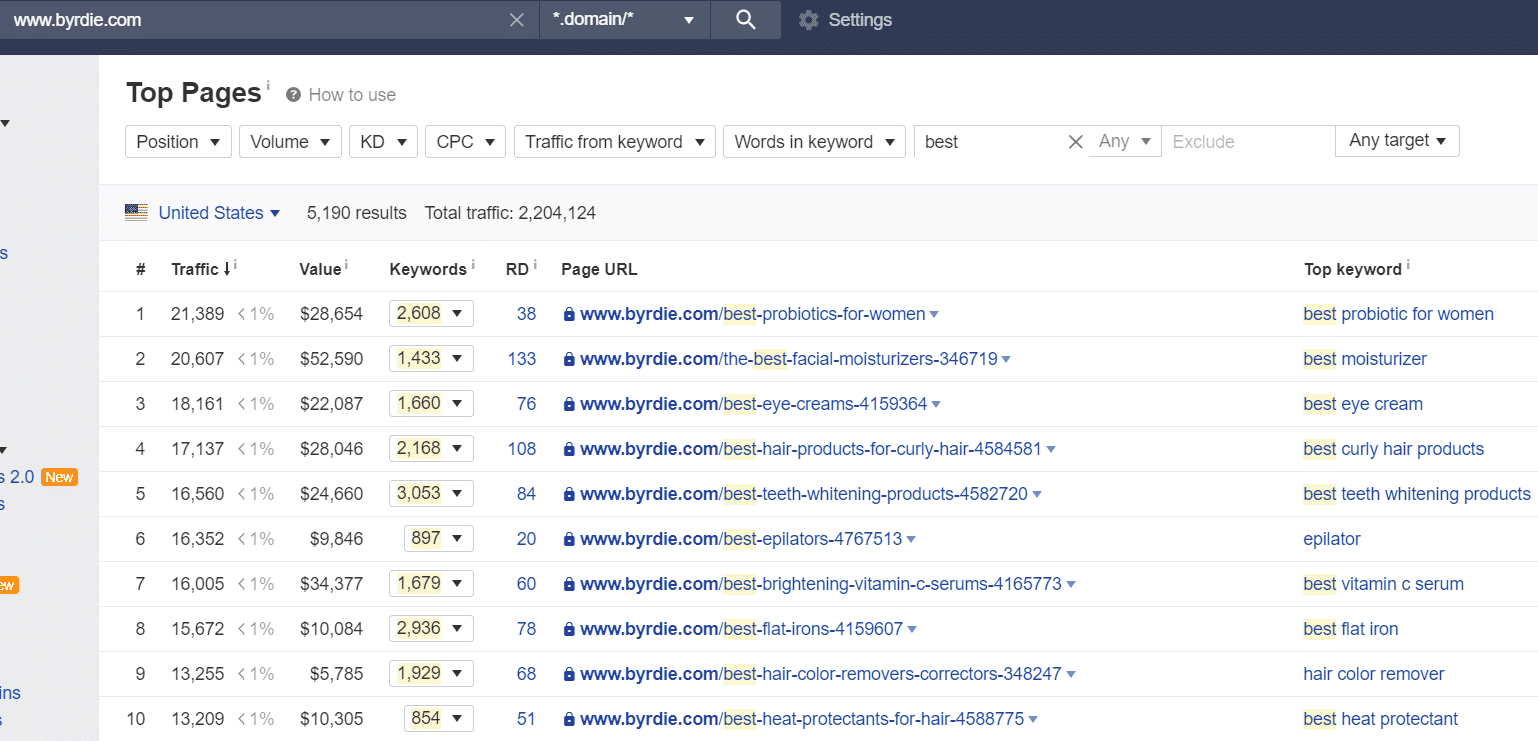
To summarize my research this month:

At this point, I am starting to (consciously) change how I view my current project.
I'm acutely aware that it may not turn out to be the "passive income" source that I had originally envisioned when I first began my journey.
This situation is one that I considered before I left my job: how would I feel if the venture didn't turn out to be (as) profitable?
For me, my response now remains the same as it was 2.5 years ago.
Even if I don't make (as much) money, I'd still be very happy that I created something which could help solve a problem for someone else in this world. 💯
Although making money is certainly important, I look at life instead from a legacy standpoint. What impact will I leave behind on this world when I am long gone? 🤔
From that perspective, I see this project as more of a passion pursuit than a financial transaction (which is why I won't be selling this website, either).
Going forward (assuming no change in traffic trends), I plan to allocate more of my time towards new business opportunities.
I'll still continue to build this website in the background but spend less time on producing content and building backlinks. For example, I plan to spend the cash flow that the website generates to pay professionals in my field to write for me.
I also plan to change my content strategy to produce more info articles about acne scars rather than only affiliate content (as I had originally intended!).
Next, I'll provide a summary of the business activities this month.
If you'd like, you can skip ahead to the next section where I discuss new opportunities.
This month, I made a number of key changes to my technology stack.
First, I'm using multiple browser extensions to obtain free SEO metrics (except for Ahrefs):
Second, I tried out the leading SEO software providers (Ahrefs, Moz, SEMRush) and concluded that the best bang for my buck is still Ahrefs' $99/mo Lite plan.
Moz, unfortunately, doesn't provide much beyond keyword research, backlinks, rank tracking, and technical website audits. Surprisingly, Moz has NO traffic estimates.
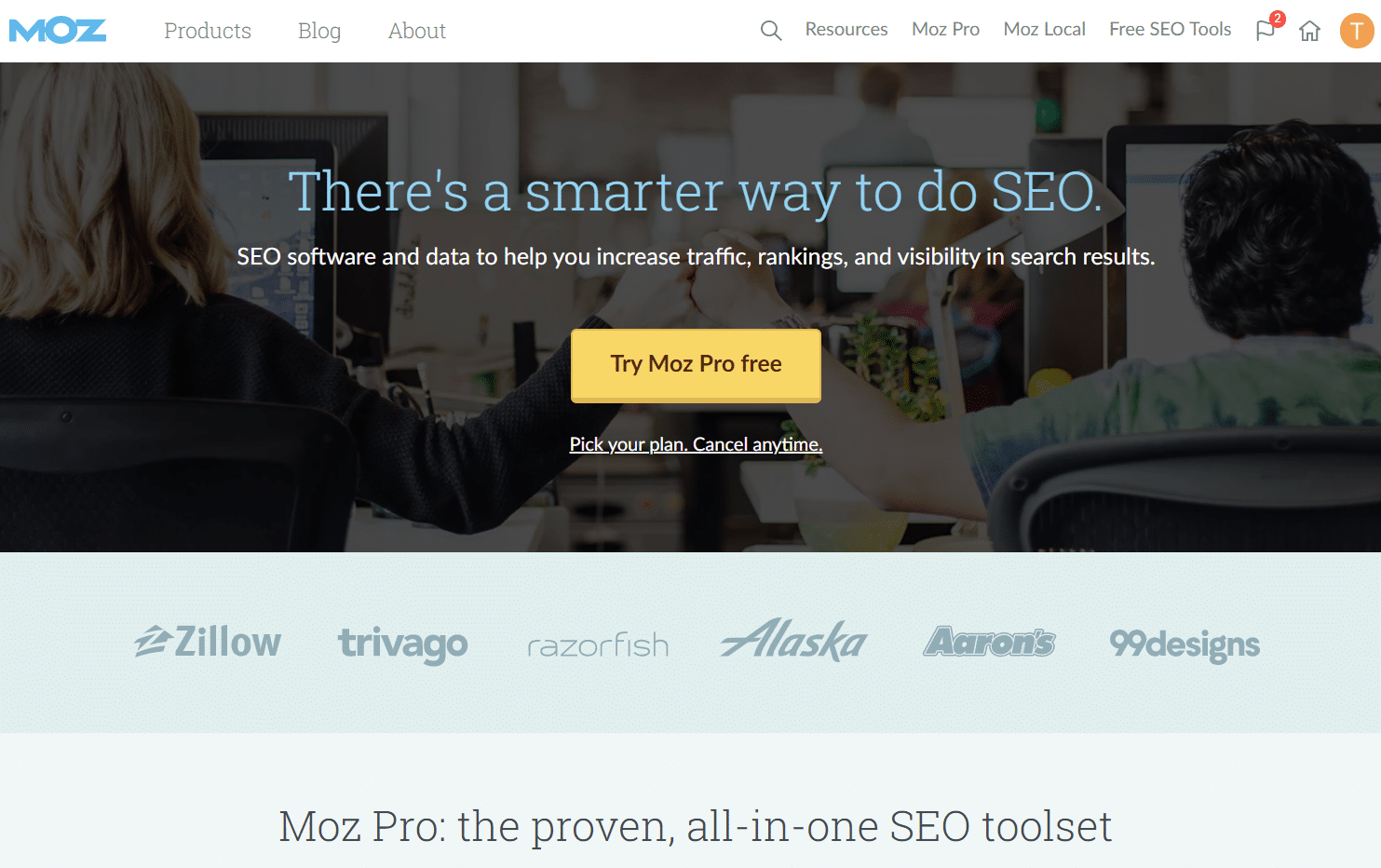
SEMRush is better and boasts a full suite of digital marketing tools, including traffic estimates (but the data is only updated monthly so it's nowhere near as granular as Ahrefs).
I was particularly impressed by SEMRush's link audit tool which has sophisticated methods of detecting footprints in a backlink profile (indicative of PBNs and spam).
However, the more interesting features in SEMRush are only available with a premium plan ($299/mo+). No thanks!!
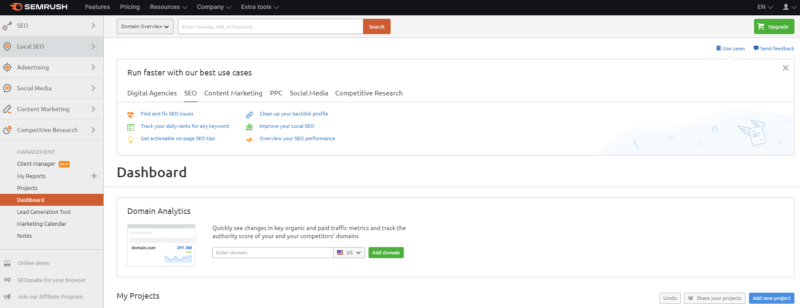
Last month, I also tried out LinkResearchTools which was a fantastic backlink tool for conducting link audits and preparing disavow files. It's an expensive one, though ($199/mo).
Third, I added a few more lifetime deals (LTDs) from Appsumo to my software stack:
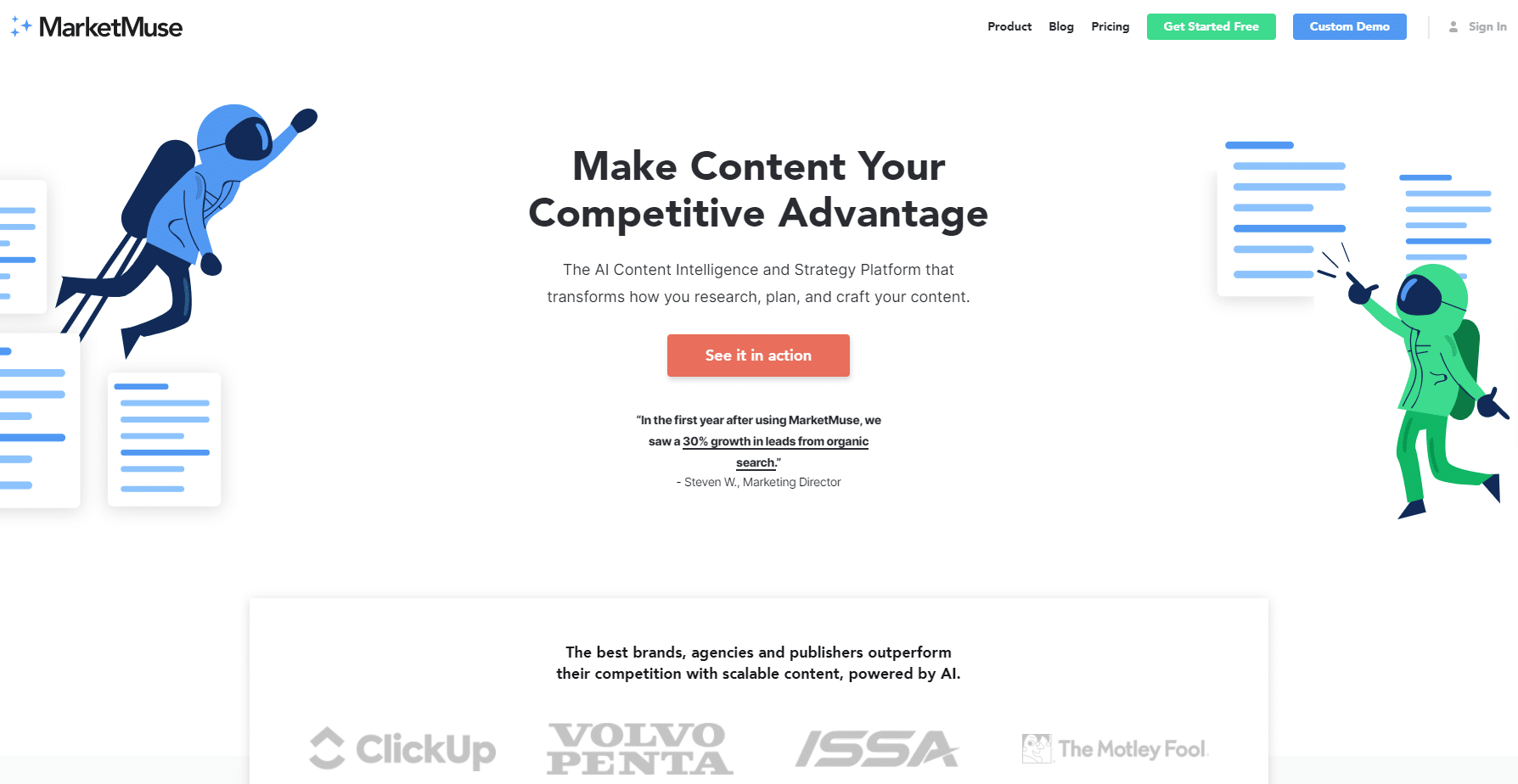
Fourth, I bought a lifetime licence for Molongui to add customizable author boxes to my website. This may help demonstrate "E.A.T." as I get more professionals to write for me.
Fifth, I added a floating table of contents (using Easy Table of Contents and Q2W3 Fixed Widget), custom author byline, and estimated reading time to each post.
Sixth, I had two temporary outages at Cloudways. Both instances were due to server overload while I was making changes in the Wordpress backend. Support increased my server's memory limit from 32MB to 128MB which should resolve this issue.
As I mentioned last month, I'm looking to bring in professionals to write for my website, including dermatologists, estheticians, and salon owners.
This may help with E.A.T. (but no guarantees). In any case, I onboarded 2 professionals this month that I found through a subreddit forum.
Next, I'll need to develop writing guidelines and templates for them to follow.
Separately, I optimized my content with MarketMuse and Frase and created yet another info article for link building (but haven't started the outreach yet).
Overall, when it comes to content creation, I'm going back to the basics of good keyword research by picking keywords/topics that I have a realistic chance of winning/ranking.
A lot has changed on the SERPs over the last 2+ years (as we saw in the traffic graphs).
Whereas there used to be smaller competitors (DR<30) on page 1 before, now there might only be larger competitors (DR>50). So I need to take this into account.
What I've seen from both the September 2019 and December 2020 Core Updates is that the relevancy of an article seems to matter less and less compared to the authority of the domain.
Often, my posts are the most relevant for a query (confirmed by doing a search in quotations " ") but Google choses to rank less relevant pages from higher authority domains instead. 🤷♂️
Finally, I reviewed my progress in 2020 on backlink acquisition.
After the Chiang Mai SEO Conference, I switched to 100% agency-built guest posts instead of my (very inefficient) email outreach campaigns.
The first few links really moved the needle and helped boost the visibility of my website tremendously. When I sent a few links to a money page (with optimized anchor texts), the corresponding rankings increased within a few weeks.
This was very helpful for winning a few money keywords that helped increase revenue.
However, I found that the effectiveness of this strategy declined over time: adding the same couple links didn't move the needle anymore for traffic nor for individual rankings.
I suspect there are a number of possible reasons:
At this point, I'm going to stop using agency backlinks (maybe try one or two from LinkGraph).
The biggest problem is that you can't vet the domain before you buy it, which means you're really taking a gamble on the domain quality.
For example, out of the 28 paid guest posts that I've bought, about half were fantastic domains, a third were really bad or showed signs of past algorithm penalties, and the remaining sixth were in-between with flat or up-and-down traffic.
P.S. I've found that the best indicators of domain quality are TRUST scores (Majestic Trust Flow and LinkResearchTools Trust), followed by traffic estimates from Ahrefs and Ubersuggest.
For the next little while, I'm exploring new business opportunities. I'd like to get a better picture of what's possible (for my skills and experience level) out there.
While I'm leaning towards another content website, I'd like to develop into other areas of business as well, such as operations (logistics, distribution, supply-chain), management (have employees or contractors), and finance (raising capital, finding investors).
Here are a few ideas that pique my interest:
My "hard-and-fast" rules would be to:
Is it time that I jump into the dropshipping scene? Feels very crowded by now.
Worth taking a deeper dive to learn more about this business model.
Another option is to build my own brand.
I'm also considering selling my services in SEO. I don't know if I have enough real experience to do this but I might test the waters here.
I'm also open to the idea of working for an SEO agency to hone my skills.
However, this path would only lead me further down the SEO specialist route...
While I'd prefer to start another business venture, I am not against working a "regular" job again.
The world has changed A LOT since I decided to leave my old job. I think employers today are much more open about remote work and virtual work than ever before.
Ultimately, if I can obtain some of the flexibility that I'm after (control over location, time, type of work, etc.), working for someone else is not a terrible idea.
I am a practical person and I recognize that you make a lot of sacrifices in your personal life to pursue entrepreneurship / your own business.
Suddenly, it becomes a lot more difficult to get things done without a traditional "proof of income" - everything from renting an apartment, getting a credit card, or buying a home.
So I'm at the point where I need to consider whether I want to keep building businesses, at the cost of delaying other important things in my life. 🤔
To Flexibility and Freedom,
Tom